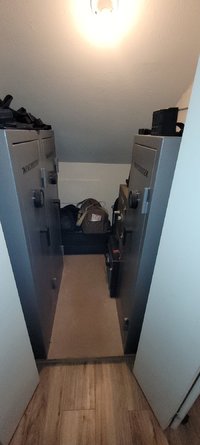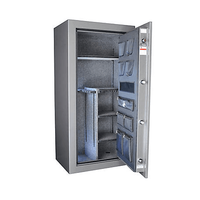Are you saying that standard policy forms do not cover guns as household contents if they are destroyed by fire, but enough remains to prove what was lost and that it was destroyed?
People can easily forget that it is the boring stuff that adds to the depreciation on a major loss claim like a house fire. 20 year old couch; furniture; appliances; snowblowers; Dillon equipment; mattresses; case sizing machines; fantasy batman costume; etc. - it all can add up in a huge way. Some companies get clever and use the term "firearms and accessories" so you can't claim the glass separately.
One catch with replacement cost - there is usually an option to replace rather than pay. My wife had a claim on a diamond ring (scheduled) and the insurer sent us to a dealer in the Washington St Temple, er I mean jewelry building, for replacement. The dealer did a fantastic job and we were very satisfied - but it was not a "convert to cash" transaction (nor should it be if the insurer can make me whole at a lower cost).
A friend's condo was burgled - he lost a 1911, Colt det special and his wife lost a lot of gold chains (she channeled Mr T). His insurer offered him like kind/quality replacement of $$ equivalent to what it would cost the insurer for the replacement, not the insured value. He eventually got the 1911 out of the NYPD property room when the guy caught it with it was ballistically perforated and DOA so they no longer needed the gun for evidence.
I'm saying the opposite. Standard policy forms treat guns as household contents for covered causes of loss on the policy
other than theft, such as fire. I have never seen "firearms or accessories" listed in the property coverage section of any of the standard homeowners forms and glass would be covered just like any other household contents anyway. I don't see what replacement cost coverage has to do w/ firearms vs glass.
How they'd determine what guns were destroyed would be the same process as anything else lost in a fire, although being mostly metal and usually in locked containers I wouldn't expect it to be very difficult to determine the extent of the loss.
And again, we're talking standard commercially available guns not guns w/ antique/collectible value which would be treated like any other items of antique/collectible value. For example: You have a Babe Ruth signed baseball when he was w/ the Sox in a case on the mantle. Priceless, right? Gets damage in a fire (which usually means soot/water damage). Unless you have an appraisal/certification of value and you schedule it on your policy as an antique/collectible, the adjuster will say "one baseball" you can buy a Rawlings at Walmart for $8.99 (unless you didn't have replacement cost coverage then they'll give you the depreciated $6.99 or something

). High value antiques/collectible collections, including firearms, are usually best insured on specialty policies not homeowners policies.
Replace vs repay only applies to scheduled jewelry, not standard household contents - it says so right in the policy something to the effect: "we at our discretion may replace...." So if you lose one earring in a set, or one rock falls out of a ring, they can replace it of like kind and quality (i.e. size, cut, clarity). There's also the matter of inflated appraisals, I have heard radio commercials where they say they guarantee the item to appraise for twice what you paid for it - of course the insurance company isn't going to pay the appraised value if they can replace the same item at a lower cost than an inflated appraisal.
Again, the friends condo you mentioned involved
theft of a firearm & jewelry where there are special limits of liability that apply. With fire or other covered causes of loss, firearms & jewelry are treated like any other household contents. If you don't carry replacement cost coverage, then they'll deduct for depreciation just like with any other household contents. If people don't know whether they have replacement cost coverage, can't do much about that.


